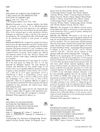 4 citations,
January 2014 in “The Scientific World Journal”
4 citations,
January 2014 in “The Scientific World Journal” Red deer antler extract helps hair grow by extending the growth phase and increasing cell growth in hair follicles.
3 citations,
August 2021 in “Nutrition research” Estrogen affects how vitamin A is processed in mouse skin, which may impact acne treatment, hair growth, and skin defense.
March 2024 in “Veterinary sciences” Geriatric Julia Creek dunnarts often suffer from reproductive and skin diseases, impacting conservation efforts.
 December 2022 in “International Journal of Biomedicine”
December 2022 in “International Journal of Biomedicine” Androgens may worsen COVID-19 and hair loss could indicate the disease's severity.
 June 2018 in “The Journal of Sexual Medicine”
June 2018 in “The Journal of Sexual Medicine” Men with lower education levels are more likely to have erectile dysfunction if they have coronary artery disease.
 November 2014 in “John Wiley & Sons, Ltd eBooks”
November 2014 in “John Wiley & Sons, Ltd eBooks” Eating high-glycemic and dairy foods can increase hormones that may cause acne and other health issues.
 May 2020 in “Current developments in nutrition”
May 2020 in “Current developments in nutrition” Low dose finasteride doesn't change lipid profile or metabolic parameters in mice.
 370 citations,
September 1999 in “The New England Journal of Medicine”
370 citations,
September 1999 in “The New England Journal of Medicine” Finasteride and minoxidil are effective for hair loss, but continued research is needed for better treatments.
 310 citations,
November 2011 in “Environment International”
310 citations,
November 2011 in “Environment International” Anticancer drugs are increasingly found in surface waters, and their long-term environmental effects are not well understood, requiring better testing methods.
 295 citations,
March 2016 in “Life Sciences”
295 citations,
March 2016 in “Life Sciences” Air pollution worsens skin diseases and aging by causing inflammation and oxidative stress.
 205 citations,
July 2009 in “Journal of Dermatological Science”
205 citations,
July 2009 in “Journal of Dermatological Science” Male and female skin differ in many ways, which could lead to gender-specific skin treatments.
 137 citations,
March 2006 in “Cns Drug Reviews”
137 citations,
March 2006 in “Cns Drug Reviews” Finasteride treats enlarged prostate and hair loss, but may cause side effects in some patients.
 115 citations,
September 2012 in “Experimental Dermatology”
115 citations,
September 2012 in “Experimental Dermatology” Androgens have complex effects on hair growth, promoting it in some areas but causing hair loss in others, and our understanding of this is still evolving.
 97 citations,
April 2016 in “Andrology”
97 citations,
April 2016 in “Andrology” Hormones and metabolism play a complex role in prostate enlargement, and more research is needed to improve diagnosis and treatment.
 78 citations,
February 2011 in “Canadian Medical Association Journal”
78 citations,
February 2011 in “Canadian Medical Association Journal” Acne treatment varies, with topical and systemic therapies effective, and more research needed on treatment order and long-term effects.
 68 citations,
June 2005 in “Expert Opinion on Therapeutic Targets”
68 citations,
June 2005 in “Expert Opinion on Therapeutic Targets” Oestrogens help maintain healthy skin, heal wounds, and may protect against skin aging and cancer.
 41 citations,
November 2003 in “Annals of the New York Academy of Sciences”
41 citations,
November 2003 in “Annals of the New York Academy of Sciences” Male hormones, or androgens, affect women's health in areas like mood and bone density, and hormone replacement therapy using antiandrogenic progestogens can improve mood disorders and alertness in menopausal women.
 39 citations,
April 2007 in “Therapeutic Drug Monitoring”
39 citations,
April 2007 in “Therapeutic Drug Monitoring” Finasteride affects urinary steroid profiles and can potentially hide steroid abuse in sports drug testing.
 34 citations,
January 2018 in “International Journal of Dermatology”
34 citations,
January 2018 in “International Journal of Dermatology” Scalp cooling is the most effective FDA-approved method to prevent chemotherapy-induced hair loss, but more research is needed for other treatments.
 34 citations,
September 2013 in “Urology”
34 citations,
September 2013 in “Urology” Long-term use of a certain medication can worsen erectile function in aged rats by damaging penile muscle cells.
 34 citations,
January 2004 in “Revista do Hospital das Clínicas”
34 citations,
January 2004 in “Revista do Hospital das Clínicas” Finasteride may worsen infertility in men with existing issues, but stopping it can improve sperm health.
 32 citations,
February 2014 in “Psychopharmacology”
32 citations,
February 2014 in “Psychopharmacology” Dutasteride makes alcohol less sedating and may lead to less drinking in men.
 25 citations,
March 2017 in “Archives of Dermatological Research”
25 citations,
March 2017 in “Archives of Dermatological Research” Sinapic acid may help hair growth by activating a specific cell pathway.
 23 citations,
July 1993 in “Pharmacotherapy”
23 citations,
July 1993 in “Pharmacotherapy” Finasteride treats enlarged prostate and baldness, but may cause limited urinary improvement and sex-related side effects.
 21 citations,
December 2007 in “Primary Care”
21 citations,
December 2007 in “Primary Care” Early diagnosis and treatment of PCOS is crucial to reduce emotional distress and health risks.
 19 citations,
April 2015 in “European Journal of Pharmacology”
19 citations,
April 2015 in “European Journal of Pharmacology” Dihydrotestosterone (DHT) doesn't affect rat skin cell growth, but it does change cell cycle, protein levels, and other cell functions, potentially shortening hair growth cycle.
 18 citations,
October 2018 in “Journal of The American Academy of Dermatology”
18 citations,
October 2018 in “Journal of The American Academy of Dermatology” Some skin medications can harm male fertility, but they don't seem to cause birth defects from father's exposure.
 18 citations,
March 2009 in “Medical Hypotheses”
18 citations,
March 2009 in “Medical Hypotheses” The document suggests that blocking sweat glands with antiperspirants might allow skin-generated hormones to be absorbed, possibly increasing breast and prostate cancer risk.
 14 citations,
December 2003 in “Medical Hypotheses”
14 citations,
December 2003 in “Medical Hypotheses” Male-pattern baldness might be caused by the effect of hormones on scalp blood vessels.
 9 citations,
March 2009 in “Psychoneuroendocrinology”
9 citations,
March 2009 in “Psychoneuroendocrinology” Certain gene variations are linked to better memory in healthy Chinese women.



























